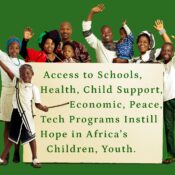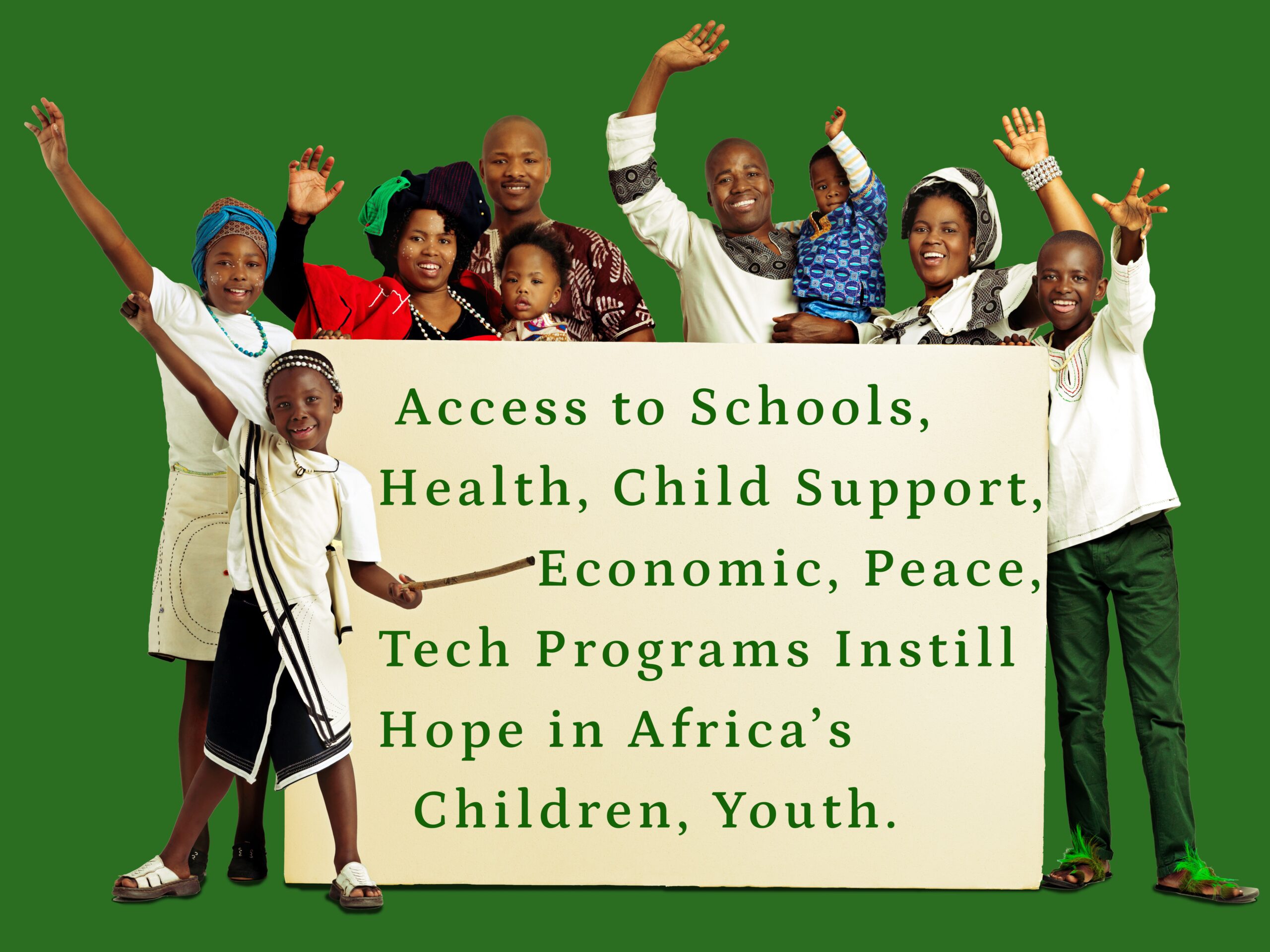
Access to Schools, Health, Child Support, Economic, Peace, Tech Programs Instill Hope in Africa’s Children, Youth
To provide for and save children and youth as they have been traumatized and rendered hopeless by living conditions on the
continent, Africa’s 54 countries are effecting greater access to schools and learning environments, health care, child and youth support, economic empowerment, peace initiatives, and technological programs, policymakers and researchers say.
The continent must contend with war and political unrest, corruption, fraud, death, disease in the midst of the pandemic that started in 2020 and famine, especially bought on by climate change to grant its children and youth a viable future, the United Nations and the World Health Organization government, business and nonprofit leaders conclude.
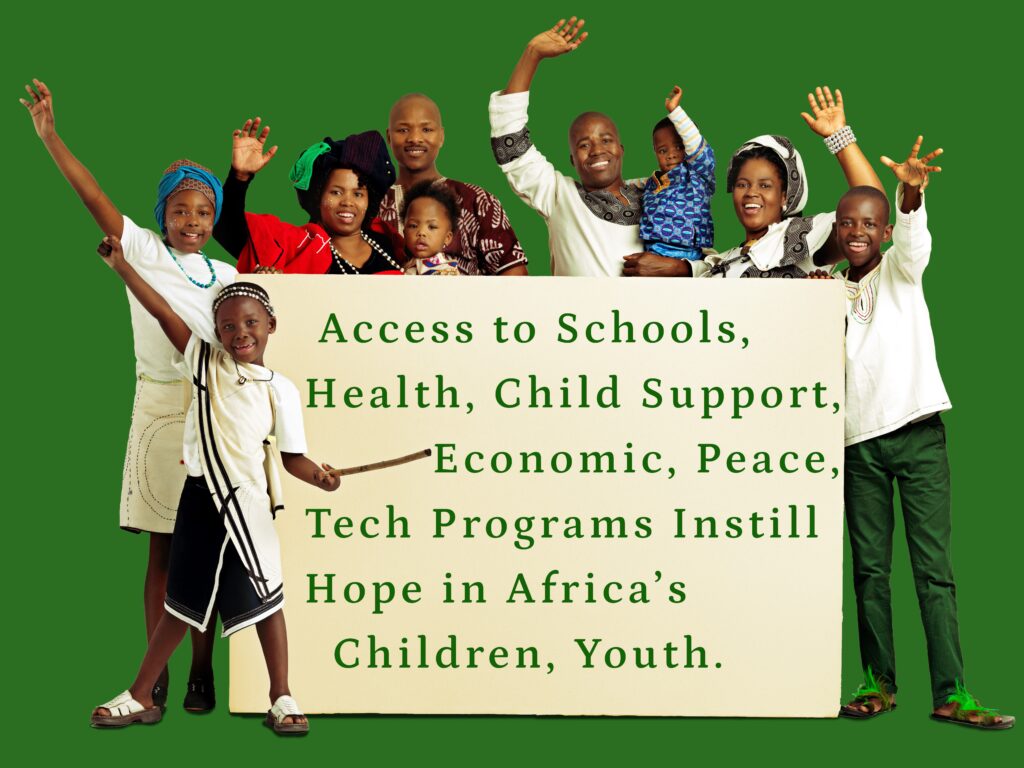
To provide for and save children and youth as they have been traumatized and rendered hopeless by living conditions on the
continent, Africa’s 54 countries are effecting greater access schools and learning environments, health care, child and youth support, economic empowerment, peace initiatives and technological programs, policymakers and researchers say.
The continent must contend with war and political unrest, corruption, fraud, death, disease in the midst of the pandemic that started in 2020 and famine, especially bought on by climate change to grant its children and youth a viable future, the United Nations and the World Health Organization government, business and nonprofit leaders conclude. As the population in Africa increases multifold, with children and young people overall comprising 60 percent, the continent’s movers and shakers are expressing optimism in their prospects as a result of a series of new programs and initiatives targeting them.
This refers and pertains to young African members of generation Y, also known as Millennials, (birthyears 1984 to 2002) and generation Z (birthyears 2003 to 2021) as generations occur in 18-year intervals.
From 1950 to the present, Africa’s population has outpaced that of Europe to hit over 1.5 billion in 2024. It is the world’s second largest, surpassed by Asia, though eventually this growth will slow down gradually until 2100 when it reaches 4.3 billion.
In 2024, Europe is the only continent with a declining population rate but by 2060 through 2070, Asia, Latin America and the Caribbean will catch up in such a decrease.
Some children and youth in Africa are becoming agents of change by being introduced to and taking part in solutions to such policy issues as education, health care and sustainable economic growth.
Organizations driving such solutions include Bread for the World, Catholic Medical Mission Board, Doctors without Borders, International Catholic Migration Mission, St. John Bosco and the Salesian Missions Lutheran World Relief, OxFam, Save the Children, Sudan Relief Fund, Technoserve, UNFPA, World Villages for Children and World Vision. For decades, programs such as techology incubators and jobs and skill-building programs have been typical in many African nations. For instance, in such countries as Kenya and Nigeria, small youth enterprises are advancing in the fields of financial technology, also known as fintech, business on the Internet, also know as e-commerce, and clean energy or green or environmentally safe energy.
This transforms whole industries and specialties and leads to sustainability in economic development.
Additionally, several politically left-wing, liberally progressive and grassroots movements are run by African youth to support and stress social services, gender equality and environmentalism, fostering their creativity, imagination, endurance and sense of innovation.
The main emphasis of policymakers and researchers is on education reform. Both seek to train and guide African youth in the skills and experience they need to succeed in a competitive world.
However, challenges still abound such as access to technical resources, missing infrastructure and a lack of geopolitical stability in some parts of the continent.
Africa encounters difficulty in maintaining the health, safety and security of children and youth who are negatively impacted by poverty, war, displacement, medical disparities and education.
The continent targets these problems facing children and youth in the following ways:
Education Access and Quality Improvement
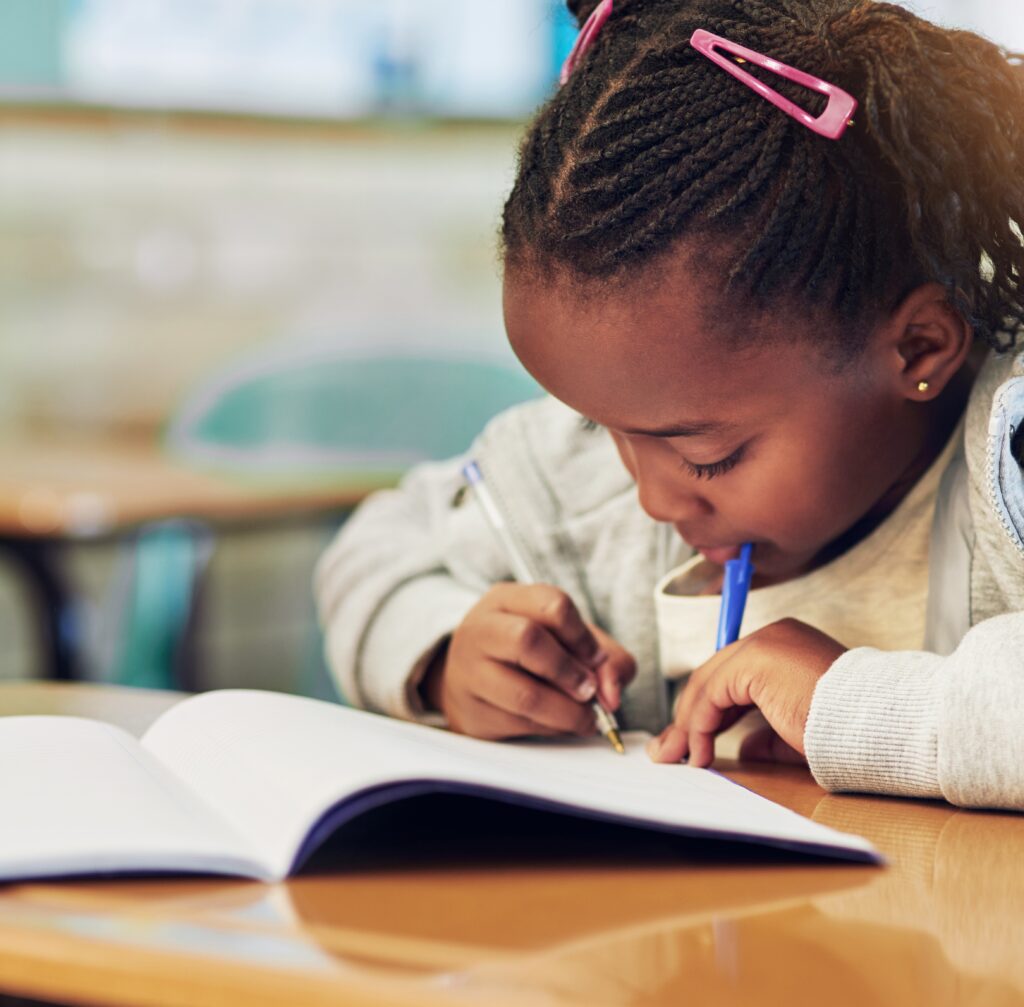
Education is crucial to breaking the cycles of poverty and fostering resilience among young people. Various African governments have committed to improving educational access, quality, and infrastructure, with initiatives to increase enrollment rates, reduce dropout rates, and close gender gaps. Organizations like UNICEF, UNESCO, and the African Union have also collaborated on programs to promote accessible education, particularly in rural and underserved areas.
Additionally, many countries are integrating technical and vocational education to equip youth with employable skills.
Healthcare and Nutrition Programs
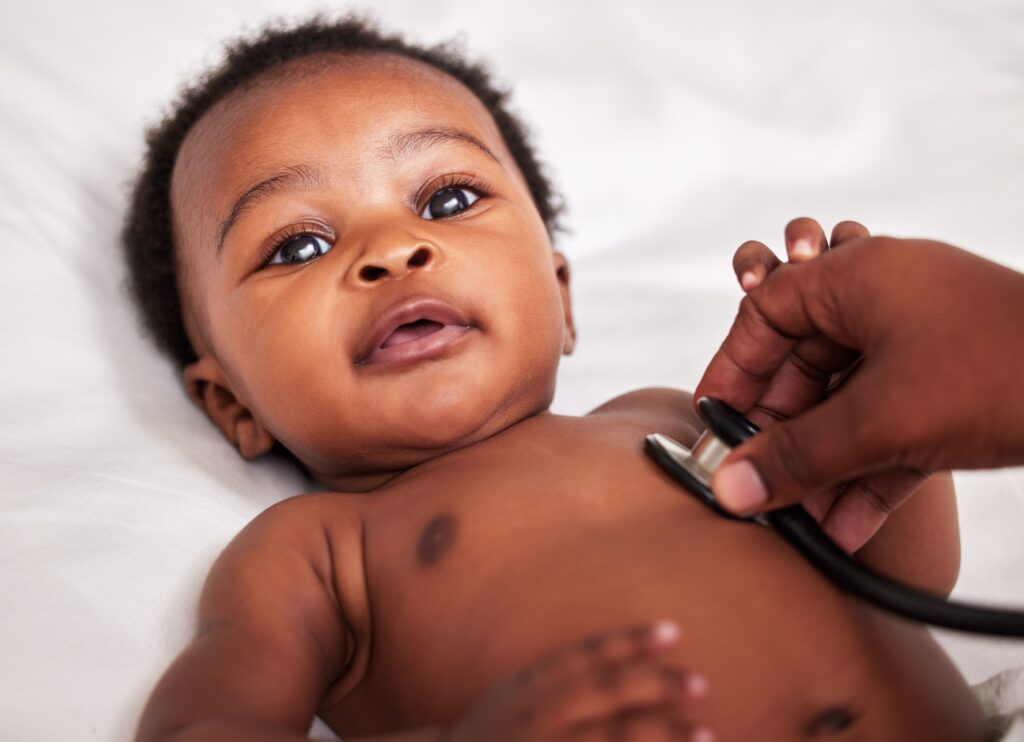
Many African countries, with support from NGOs, also known as nongoverning organizations, and international partners, are working to improve healthcare services, particularly for maternal and child health. Initiatives like the Saving Lives and Livelihoods program by the Africa CDC, also known as the Centers for Disease Control and Prevention, and immunization campaigns are crucial in combating preventable diseases and reducing infant mortality rates.
Nutrition programs focus on providing healthy meals in schools and fighting malnutrition, which affects millions of children across the continent.
These programs are critical in ensuring that children grow up healthier and are better prepared to learn and thrive.
Child Protection and Support Systems
For children who have been victims of violence, abuse, or exploitation, support systems are being established to provide counseling, legal support, and safe environments.
Organizations such as Save the Children and local child protection agencies work to strengthen community-based child protection systems, offering psychosocial support, trauma counseling, and reintegration programs.
Some countries have also passed legislation to protect children from forced labor, trafficking, and other forms of exploitation.
Economic Empowerment Initiatives
Unemployment is a significant issue for young people in Africa, but efforts are underway to empower youth economically through skill-building and entrepreneurship programs.
Initiatives like the African Youth Empowerment Program (AYEP) and the African Development Bank’s Jobs for Youth in Africa strategy are designed to create jobs, improve access to finance, and encourage young entrepreneurs.
Some countries are also providing micro-loans and business incubators to help young people start businesses and contribute to the local economy.
Conflict Resolution and Peacebuilding Efforts
To create a safer environment, African governments and international organizations are working toward conflict resolution, peacekeeping, and reintegration programs for child soldiers.
Programs also focus on educating communities on peaceful conflict resolution and reconciliation. Such efforts aim to reduce the impact of violence on youth and help them rebuild their lives in a supportive environment.
Mental Health and Psychosocial Support
With increasing awareness of mental health challenges, more resources are being directed toward providing mental health support for children and youth.
Programs targeting trauma and stress-related issues are offered through schools, community centers, and clinics.
Many African NGOs are advocating for mental health to be included in primary healthcare services to ensure that even the most vulnerable children can access psychological support.
vast potential that Africa’s children and youth hold.
By investing in their well-being, Africa is fostering a generation that can drive future development, bring stability, and shape a brighter future for the continent.
Technology and Innovation in Youth Empowerment
Digital technology is playing a transformative role in providing new opportunities for Africa’s youth. Many young people are now able to access quality education online, connect with mentors, and learn skills through mobile-based platforms.
This shift is opening doors, especially for youth in remote or underserved areas. Digital platforms also give young Africans a voice, allowing them to engage in social advocacy, share their stories, and raise awareness on issues affecting them.
Community-Based Youth Programs and Mentorship
Local organizations, churches, and community groups play an essential role in providing support for young people.
Community-based programs offer mentorship, after-school programs, sports, and creative outlets, helping youth build a sense of identity, self-worth, and community.
These programs offer safe spaces where children and teens can learn life skills, stay engaged in positive activities, and find guidance from local mentors.
The Path Forward
While the road to protecting and empowering Africa’s young generation is complex, the continent is making significant strides.
These collective efforts represent not just hope, but also a recognition of the vast potential that Africa’s children and youth hold.
By investing in their well-being, Africa is fostering a generation that can drive future development, bring stability, and shape a brighter future for the continent.



